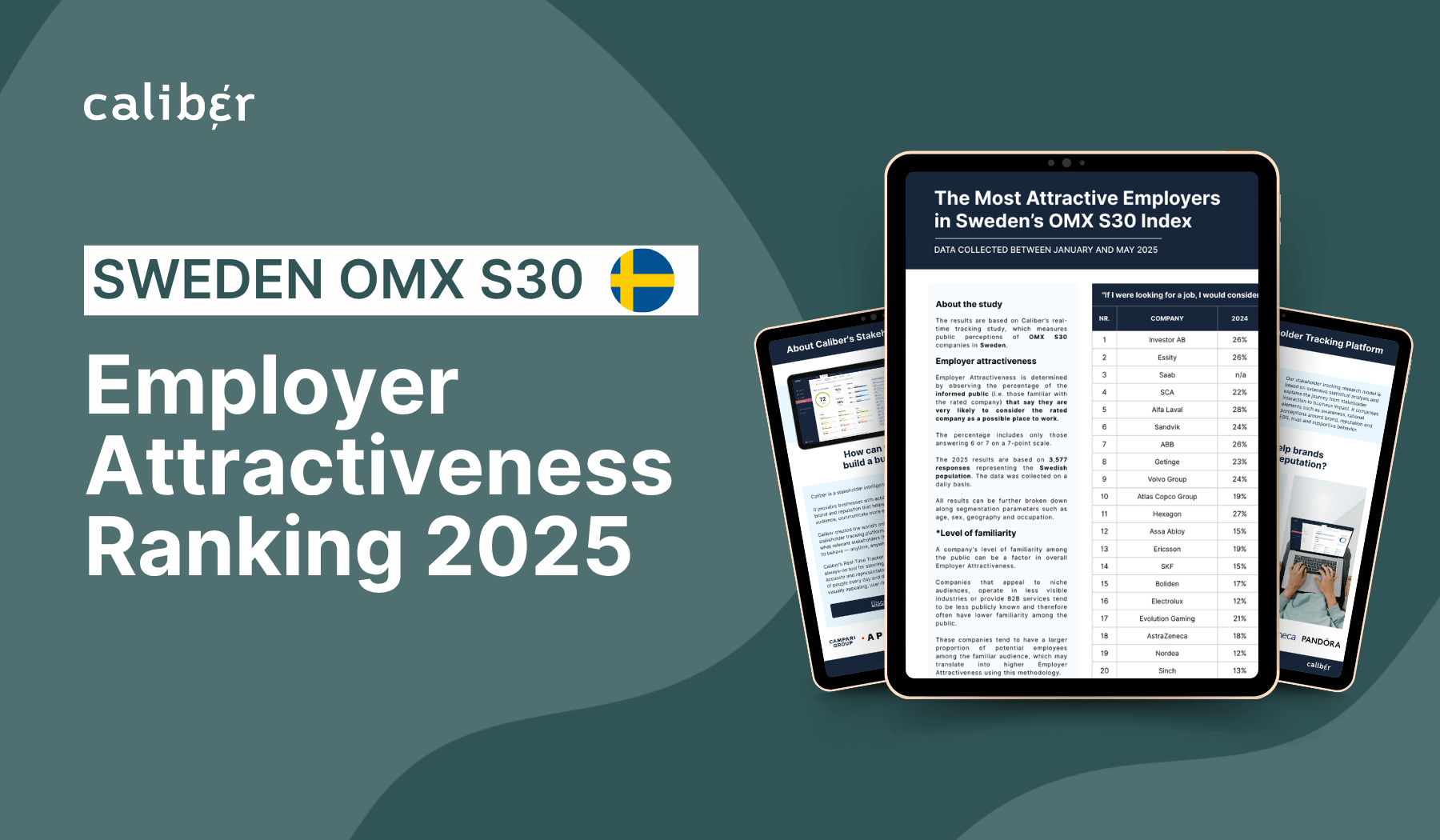

At the beginning of every year we aggregate the results of our daily brand & reputation monitoring around the world throughout the preceding year, and create company reputation rankings in different countries and industries. At the beginning of 2021, we did the same.
This time, however, our curiosity was not just about which companies came out on top – but also, as may be expected, about how the Coronavirus pandemic impacted reputations around the world. When it comes to Sweden’s companies listed in the OMX S30 stock market index – the results were both expected and surprising.
Starting with the obvious – the most and least reputable companies in the S30 list – reveals public perceptions that may seem obvious to those familiar with the Swedish market: local icons like Volvo and Electrolux are ranked at the top of the list as the most trusted and liked companies in the country, while three of the country’s largest banks are placed in the bottom 5.
So far, so expected. But upon closer examination, we find some interesting revelations.
The first noticeable fact is that Volvo Group sits high above everyone else with a Trust & Like Score of 69.1 – more than 4 points higher than its runner-up, whose score is much closer to the rest of the top-5 companies.
While the truck manufacturer’s score is still within the tier we consider as ‘average’, it clearly enjoys a significantly stronger reputation among the Swedish public than all other S30 companies, and the rise in its score from 2019 suggests this advantage keeps getting bigger.
Despite having to reduce its workforce and suffering financially from the impact of COVID-19 on the global commercial vehicle market, the company has managed to maintain its strong reputation domestically.
The other interesting revelation is that even though three of the country’s largest banks are ranked lowest, they did not all move in the same direction last year. In fact, while SEB’s score declined substantially from 2019 (as did Handelsbanken’s score further up in the ranking), the scores of Nordea and Swedbank actually increased significantly from 2019.
We’ve seen before that the global banking industry has had an overall negative reputational impact from the pandemic, but the results in Sweden show that some banks were affected negatively while others positively. Is this a result of the different ways they reacted to the crisis?
Over the last year, it has been impossible not to notice the high-profile debate on Sweden’s unique approach to dealing with the pandemic. Given this debate and the nearly obsessive comparisons these days between Sweden and the rest of the world – our analysts were eagerly anticipating the results of our own comparison of the reputational impact of the pandemic in Sweden and elsewhere throughout 2020. And they were not disappointed.
The simplest way for us to see the impact throughout 2020 – ignoring the many fluctuations that happened month by month during this volatile period – was to compare the average scores given by the public to all companies monitored in each county in the first ten weeks of the year, with the corresponding scores given in the last ten weeks.
That comparison has indeed shown an interesting relationship between how countries experienced the pandemic in general and what the reputational impact has been in each country.
Countries like the US, Brazil, and Italy, which all were ravaged by the pandemic last year, have also seen the greatest reputational drops with average score changes of between 4 and 7 points. On the other hand, Sweden is positioned at the top of the table as the country whose companies experienced the greatest overall reputational boost throughout the year.
This could mean two things:
Most likely, it’s a combination of both. Without a doubt, this has something to do with the inclusion of AstraZeneca in the S30 list – a company whose reputation has had a whopping 9-point jump from 2019, for obvious reasons (an unusually high increase in an annual reputation score).
If we look at the table above in another way, we can see something else: the average reputation score of Sweden’s largest companies still sits far below the average score in every other market in this comparison.
Even though people in Sweden have gotten more positive about their business icons last year, they still tend to mistrust and dislike companies compared to people in other countries – even when compared to Nordic neighbors such as Denmark and Norway.
This is indeed a phenomenon we have seen in Sweden over many years. If the pandemic stays with us for much longer, one of its few positive side effects may be that the Swedes will join their neighbors and become less skeptical of big business.
© 2024 Group Caliber | All Rights Reserved | VAT: DK39314320